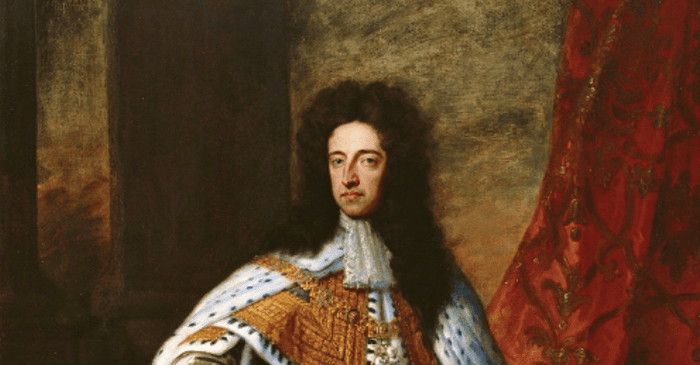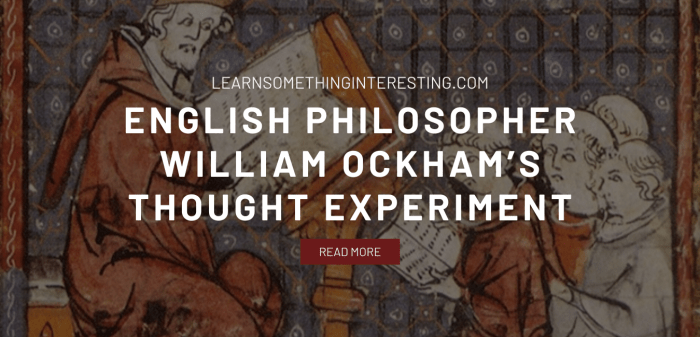English philosopher william of crossword – Embark on an intellectual journey as we delve into the enigmatic world of English philosopher William of Ockham. His groundbreaking ideas, particularly his theory of nominalism, continue to resonate in philosophical debates today.
Ockham’s life and times were marked by intellectual and political turmoil, shaping his perspectives on metaphysics, epistemology, and the nature of knowledge. We will explore his contributions to logic, including the renowned principle of parsimony (Occam’s Razor).
William of Ockham’s Life and Times: English Philosopher William Of Crossword

William of Ockham was an English philosopher and theologian who lived in the 14th century. He is considered one of the most important figures in the history of philosophy, and his ideas have had a profound influence on Western thought.
Ockham was born in Ockham, Surrey, England, in about 1285. He studied at Oxford University, where he became a Master of Arts in 1306. He then joined the Franciscan Order and was ordained a priest in 1308.
Ockham’s life was marked by conflict and controversy. He was a strong supporter of the Franciscan Order, and he defended the Order’s position in a number of disputes with the papacy. In 1324, he was accused of heresy and was forced to flee Oxford.
He spent the rest of his life in exile, writing and teaching at various universities in France and Germany.
Ockham died in Munich, Germany, in 1347. He was buried in the Franciscan monastery there.
Historical and Intellectual Context
Ockham lived during a time of great intellectual and social change. The rise of nominalism, a philosophical doctrine that denies the existence of universals, was challenging the traditional Aristotelian view of the world.
At the same time, the conflict between the papacy and the monarchy was reaching a boiling point. Ockham was a supporter of the Franciscan Order, which was aligned with the papacy. He defended the papacy’s authority in a number of his writings.
William of Ockham’s Philosophical Ideas

Ockham is best known for his theory of nominalism. Nominalism is the doctrine that only individual things exist, and that universals are merely names that we give to groups of similar things.
Ockham’s theory of nominalism has a number of implications for metaphysics and epistemology. In metaphysics, it means that there is no such thing as a universal nature or essence that is shared by all members of a species.
In epistemology, it means that we can only know individual things, and that we cannot know universals directly.
Universals, Individuality, and Knowledge
Ockham’s theory of nominalism led him to develop a number of new ideas about universals, individuality, and knowledge.
- Universals:Ockham argued that universals are not real entities that exist independently of individual things. Rather, they are merely mental constructs that we use to group similar things together.
- Individuality:Ockham argued that individual things are the only real entities that exist. He denied that there is any such thing as a universal nature or essence that is shared by all members of a species.
- Knowledge:Ockham argued that we can only know individual things. We cannot know universals directly, because they do not exist independently of individual things.
Logic and Occam’s Razor
Ockham was also a major contributor to logic. He developed a number of new logical principles, including the law of parsimony, which is also known as Occam’s Razor.
Occam’s Razor states that “entities should not be multiplied beyond necessity.” This principle means that we should not assume that there are more entities in the world than are necessary to explain the phenomena that we observe.
William of Ockham’s Political and Religious Views
Ockham was a strong supporter of the Franciscan Order, and he defended the Order’s position in a number of disputes with the papacy.
In 1324, Ockham was accused of heresy and was forced to flee Oxford. He spent the rest of his life in exile, writing and teaching at various universities in France and Germany.
Church and State
Ockham argued that the church and state are two separate and distinct entities. He denied that the pope has any authority over secular rulers.
Ockham’s views on church and state were influenced by his experiences with the conflict between the papacy and the monarchy. He saw the papacy as a corrupt and oppressive institution, and he believed that the state had a duty to protect its citizens from the pope’s tyranny.
The Rights of Individuals
Ockham was a strong advocate for the rights of individuals. He argued that all individuals have the right to life, liberty, and property.
Ockham’s views on the rights of individuals were influenced by his experiences with the persecution of the Franciscans by the papacy. He saw the persecution of the Franciscans as a violation of their basic human rights.
Theology
Ockham was a devout Christian, but he was also a critic of the Catholic Church. He argued that the church had become corrupt and that it had strayed from the true teachings of Jesus Christ.
Ockham’s theological views were influenced by his nominalist philosophy. He argued that God is not a universal being, but rather a particular individual being.
William of Ockham’s Influence and Legacy

Ockham’s ideas have had a profound influence on Western thought. His theory of nominalism was a major challenge to the traditional Aristotelian view of the world, and it helped to pave the way for the development of modern science.
Ockham’s ideas on church and state were also influential in the development of modern political thought. His arguments for the separation of church and state and for the rights of individuals helped to lay the foundation for the modern democratic state.
Later Philosophers, English philosopher william of crossword
Ockham’s ideas influenced a number of later philosophers, including John Duns Scotus, John Wycliffe, and Martin Luther.
- John Duns Scotus:Scotus was a Scottish philosopher who lived in the 14th century. He was a critic of Ockham’s nominalism, but he was also influenced by Ockham’s ideas on individuality and the rights of individuals.
- John Wycliffe:Wycliffe was an English theologian who lived in the 14th century. He was a follower of Ockham, and he used Ockham’s ideas to attack the Catholic Church.
- Martin Luther:Luther was a German theologian who lived in the 16th century. He was a follower of Wycliffe, and he used Ockham’s ideas to attack the Catholic Church and to develop his own Protestant theology.
Intellectual Traditions
Ockham’s ideas have been received in different ways in different intellectual traditions.
- Medieval Theology:In medieval theology, Ockham’s ideas were often seen as a threat to the traditional Aristotelian view of the world. However, some theologians, such as John Duns Scotus, were able to reconcile Ockham’s ideas with traditional theology.
- Renaissance Humanism:In Renaissance humanism, Ockham’s ideas were seen as a positive force. Humanists saw Ockham as a champion of reason and individual freedom.
- Modern Science:In modern science, Ockham’s ideas have been used to support the development of a naturalistic worldview. Scientists have used Ockham’s principle of parsimony to argue that the simplest explanation for a phenomenon is usually the correct one.
Ongoing Relevance
Ockham’s ideas continue to be relevant to contemporary philosophical debates. His theory of nominalism is still a major challenge to the traditional Aristotelian view of the world, and his ideas on church and state and the rights of individuals are still influential in political thought.
FAQ Corner
When and where was William of Ockham born?
Ockham was born around 1285 in Ockham, Surrey, England.
What is Ockham’s Razor?
Ockham’s Razor is a principle of parsimony that states that the simplest explanation is usually the correct one.
What was Ockham’s role in the conflict between the papacy and the monarchy?
Ockham supported the Holy Roman Emperor Louis IV in his conflict with Pope John XXII, arguing that the emperor had the right to rule independently of the pope.